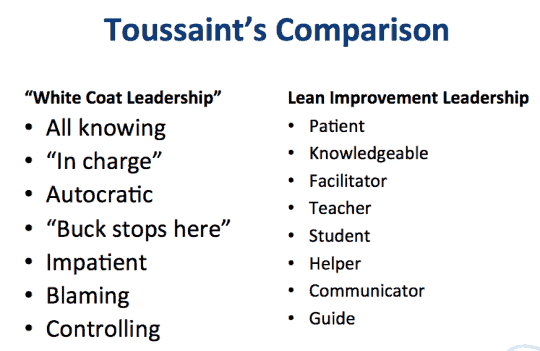My reader survey (with prizes) is still open through Friday.

I recently stumbled across the movie Meet the Fockers on TV recently and was reminded of the “circle of trust” (Robert DeNiro, pictured at left, see video here).
It's almost a cliche' in LinkedIn Groups and Lean message boards (like LEI's), where people (in a well intended way) ask questions about wanting to find a factory to visit to learn about Lean. Usually, the request is for a factory EXACTLY like theirs, and it goes something like:
“I'd like to visit a factory that makes jelly and other jams, primarily grape, in a non-union facility located in the northeast (with over 1000 employees) that is run by a left-handed plant manager with a Harvard MBA… no peanut butter plants or assembly lines.”
Over time, it seems normal that people expand what might called their “circle of learning.”
Early in a Lean journey, people typically want to just copy somebody else. This seems very natural (or at least common) and it seems faster or more efficient to do it that way. But, it doesn't really work. There is, however, an argument to be made (from the jazz world -“imitate, integrate, innovate”) for learning to copy before learning how to implement and create methods of your own in a more sophisticated way. We learn by copying and THEN can move on to more creative improvement. Also see this article for an interesting take on the need to start by copying: “People Need To Learn To Be Less Creative,” which includes this passage:
We are fundamentally an imitating species. Most innovators spend their formative years producing derivative work: Bob Dylan's first album contained 11 cover songs, comedian Richard Pryor began his career doing imitations of Bill Cosby, Hunter S. Thompson retyped The Great Gatsby just to get a feel for writing a great novel, and most of Freud's theories were riffs on Greek literature and Shakespeare. We copy to acquire knowledge that becomes the foundation for variations and extensions that appear to outsiders as thinking outside the box. As Isaac Newton said, we stand on the shoulders of giants (itself, a rephrase of a saying by 12th century French philosopher Bernard de Chartres).
You can't make variations on a theme without understanding that theme, and having the theme your are riffing on well-accepted already.
First copy… then create. Interesting. But are people focusing their sites too narrowly on who to emulate and learn from?
Early in a Lean journey, people tend to focus on how they're different (see this post) – either as a way of somehow proving why Lean “won't work here” or meaning “we can't learn Lean from them.”
Over time, that grape jelly plant manager might be willing to visit and learn from a nearby facility that makes aircraft parts… or a Toyota plant. And, maybe eventually a hospital. It's fascinating to visit factories with healthcare professionals and I'm hoping to have a chance later this year to visit ThedaCare with some manufacturing leaders. Maybe a gutsy factory manager will attend the Lean Healthcare Transformation Summit to June to learn about Lean leadership and quality. If that's going to be you, please contact me! Healthcare people can attend a Lean Startup event to learn about customer focus and PDSA. There's so much to learn when we can get out of our comfort zone.
Lean is at it's most powerful when it's about more than setting up a kanban system for car parts or doing TPM on a grape jelly cooker… Lean lessons are most transferrable when it's about Lean leadership concepts. I think any plant manager would have a lot to learn from John Toussaint, MD (since he learned from manufacturing leaders).
Other than the term “white coat leadership (referring to doctors), doesn't this table of good leadership behaviors apply to any setting?

I *love* seeing Lean in new and unexpected settings. It's made me a better Lean thinker (although that's a never-ending quest). What steps can you take to expand your circle of learning? What's the most unexpected place you've learned Lean lessons to take back to your own setting?
What do you think? Please scroll down (or click) to post a comment. Or please share the post with your thoughts on LinkedIn – and follow me or connect with me there.
Did you like this post? Make sure you don't miss a post or podcast — Subscribe to get notified about posts via email daily or weekly.
Check out my latest book, The Mistakes That Make Us: Cultivating a Culture of Learning and Innovation:










An interesting segway Mark, we playfully use the “circle of trust” here. As a change agent at any level if you do not get into the circle of trust you will have little or no influence. Everything you do will only ever be transactional and if you are lucky, contracted.
In terms of learning I to enjoy experiencing lean principles being applied in areas the tools aren’t visible. That invarialby manifests itself with an observation of Mr Toussaint’s “Lean Improvement Leadership”. I would argue that “White Coat Leadership” is in fact just traditional autocratic management.
The wider issue I have is that our HR systems are driven to unearthing White Coat Leaders and ignores those that exhibit Lean Improvement Leadership behaviours. In the short term as Lean Change Agents this is just par for the course when engaging in transformation projects but in the long term, aligning HR systems to nurture Lean Leadership behaviours is critical to sustaining any change efforts.
The best example I’ve seen is a young business apprentice challenging senior “leaders” without fear and challenging their behaviour. We quickly brought her under our wing for development in the hope she doesn’t end up going through what we describe as the “One Flew Over The Cuckoo’s Nest” syndrome – seeing as we’re working with films here :-).
Yes, “white coat leadership” as described by Toussaint is autocratic, etc. The term is unique to healthcare, but the behavior (sadly) is not.
Yes it is a matter of trust. Trust based on respect. I saw a recent headline in a business journal that said “respect [customers, employees] is now a business imperative”. Whooo whooo. Toyota got that 60 + years ago and Marriott has been working on that for over 70 years.
Trust and respect are likely in most organization’s values statement but for relatively few it is more than veneer deep.
The spine of one issue of the IIE Magazine few years ago said simply:
“CEO Listens, Learns.”
That’s newsworthy???